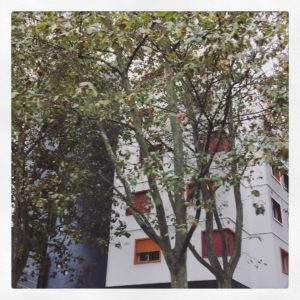
Riding high and feeling low, I went to meet and spend time with the daughter of a fiery psychoanalyst-philosopher, militant, and experimental reformer of psychiatric care in postwar France. I wanted to meet Emmanuelle Guattari without needing to exactly know why. I’d been carrying around her minty green slender novella “I, Little, Asylum” (translated by E.C. Belli, Semiotext(e), 2015) for over a year in my backpack and using a mechanical pencil to write: with, through, beside, throughout, in spite of, without, within, around, marginally, above, underneath, over, and between her book. Basically, these self-help strategies or sun salutations by which to: include, insert, mirror, and assimilate myself into this text were just ways of tricking myself into merging parts of my childhood with hers. (The desire to merge my experience with her experiences in her novella I’m saving for longer daydreamy semi-catatonic spells in bed or in a bath.) Essay. Sail. Essay-sailing. Essail. A noticeable season went by and suddenly I found myself meeting Emmanuelle in an eastern-suburb of Paris on a drizzly day slipping and sliding on the slick scales of Libra; the seventh sign of the zodiac where things shift from “personal focus” to “contact with others and with the world”. Good, makes sense. I took off and went for her like searching for a lost fraternal twin who grew up in a house of madness and maniacs halfway across the world – except in a castle. While I read her book I thought she was describing the Residents I lived with for eleven years except there weren’t any Residents in her book. I was projecting. But how else are you supposed to connect to anything without a little projection? There were Residents everywhere in her book, I swear. The mind has a sneaky way of cutting and pasting, of collaging, of transference doing somersaults in the most untrained way possible.

We met (it felt like a secret) in a working class strip mall at the Montreuil Station and I recognized her right away only because I saw an interview of her online. I approached her, said hello, and hurriedly she welcomed me with a kiss on both cheeks and took me under some invisible wing as we walked through roasted peanut smoke filled swap meats, in and out of cafes, until we made a full circle and settled in a brutal-banal coffee shop tucked in the strip mall we initially tried to get out of. It felt right because of my love for certain kinds of strip malls; giant transparent posters of coffee and sandwiches on the windows. It felt especially right because she did not know my love for them. And so it was “un-homely” as the Germans say. But also that feeling of un-homliness or whatever was totally perfect for all of its (un)familiarity because of what we were about to talk about: vague notions of crisis heterotopias, board and care facilities in Los Angeles where I grew up, and the La Borde hospital outside of Paris where she grew up. We put our coats and bags on a table to save it, kind of pretending that suddenly it would get busy in there. I was too shy to order something substantial to eat like a plain croissant when she kindly offered to treat us. So I pointed at the green grapes in a plastic container and asked for black coffee. Emmanuelle was a little curious about why only green grapes. I could be imagining this now, but there was nothing symbolic at all about the grapes. It was just something easy to eat while asking her questions. Something to casually pop in my mouth between answers and eye blinks and occasionally staring out the window. Some of the grapes were a little soggy but I ate them devotedly.
In the following weeks I’ll be posting parts of the interview.




